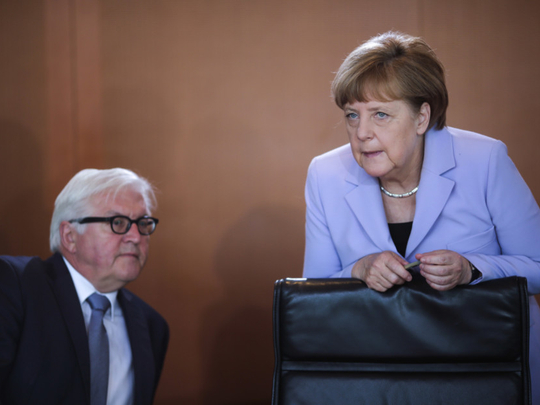
Just last autumn, German Chancellor Angela Merkel and her Austrian counterpart Werner Faymann stood together as champions for Syrian refugees seeking shelter in Europe. Both have since backpedalled and now, Faymann has resigned because of pressure within his own party to open the way to a possible coalition with the anti-immigrant Freedom Party. Merkel ought to be mindful of his fate: Inconsistency on matters of principle can be costly.
Until the European Union’s (EU) deal with Turkey, which effectively cut off the Balkan route for the refugees and others who joined them on their flight, Austria was the final country aspiring immigrants passed through on their way to Germany, where Merkel would, they thought, welcome them. It was a transit country, but some of the newcomers decided to stick around — with 88,151 asylum applications filed, more than at any time in recent memory:
Germany, of course, accepted 442,000 first-time asylum applications last year, and many more refugees — about 1.1 million — actually came in, so the migration offices are still besieged and swamped. But Germany is much bigger than Austria. Each added more than 1 per cent to their populations.
Austrians were even less ready for this than Germans. While International Labour Organisation figures show German unemployment shrank to 4.2 per cent in March from 4.8 per cent a year earlier, in Austria it rose almost to 11 per cent in January before declining to 9.1 per cent in April, the same as a year before, according to the Austrian Institute of Economic Research. So there was more of an opening for Austrian populists to blame economic troubles on immigrants.
The Freedom Party is one of Europe’s oldest and strongest right-wing populist parties. It was already doing quite well before the refugee crisis: In the 2013 parliamentary election it came third with 20.5 per cent of the vote, not far behind the two main centrist parties. Now, it regularly polls more than 30 per cent, far ahead of Faymann’s Social Democrats, who head the ruling coalition with a partner, the centre-right People’s Party.
The Freedom party’s leader, Heinz-Christian Strache, is the top candidate for chancellor. And in this year’s presidential election, Norbert Hofer, also representing the Freedom Party, has made it to the second round and is running head-to-head with Alexander van der Bellen, backed by the Greens. Austria’s presidency is largely ceremonial, but it’s impossible for the mainstream parties not to reckon with the strength of the hard-right populists. If there is an early election — and that’s not out of the question given the dramatic shift in parties’ popularity — the Freedom Party is likely to come in first and be asked to form the government.
The People’s Party won’t rule out a coalition with Strache and his team. Faymann has adamantly ruled it out, and many of his allies have been uneasy with that line because it’s likely to deny his party its chance to participate in government in the next election cycle.
Faymann, however, also faced pressure from the Left: Liberal party members are unable to forgive him his about-face on refugees. In September, 2015, he stood next to Merkel in Berlin as she made her famous speech that concluded: “If we must apologise for showing a friendly face in an emergency situation, then this is not my country.” Faymann responded emotionally: “I am very grateful to you that you did not hesitate to make this decision.”
He wasn’t so grateful by the end of the year, though, calling for a radical reduction of the refugee influx, closing Austria’s borders temporarily and building a fence on the border with Slovenia — not a universally popular undertaking. In March, he criticised his erstwhile German ally. “Merkel’s policy can end up damaging Austria,” he said, adding that it was “unfair” and that he didn’t want Austria “to be Germany’s buffer zone”.
It was no longer clear to Austrian Social Democrats why this Faymann was objecting to a deal with the Freedom Party. After all, the populists feel much the same about Merkel and about opening the country’s doors to refugees.
“This country needs a chancellor whose party is fully behind him,” Faymann said as he stepped down on Monday — and yet he continued to defend his stricter immigration stance, which had by then stopped making sense because of the uncannily effective Turkish deal. According to the United Nations, only 121 refugees arrived in Austria via the Balkan route on May 8, compared with an average of about 2,000 in February.
There are, of course, important differences between Merkel’s situation in Germany and Faymann’s in Austria. Merkel leads a centre-right party, not a centre-left one, so her attempts to limit the influx found more understanding among the party’s members and core voters. Merkel’s political force, the Christian Democratic Union, has slipped in the polls but it’s still by far the biggest party in the country, with no strong rival on the Right. The anti-immigrant, anti-EU Alternative for Germany party has been doing better in the polls, but it still has only 15 per cent support.
Finally, Merkel’s efforts to reduce immigration have been smarter and more efficient than Faymann’s: Instead of building fences, she made the Turkish deal, ensuring that refugees who brave the voyage from Turkey to Greece know that they will likely be returned. It is politically costly and difficult to implement, but at least it really works.
Despite all these advantages, Merkel is at risk of catching the Faymann disease: What she stands for isn’t as clear as it was last year. The courageous stance she took angered many, but it was unequivocal and visionary. The current manoeuvring shows off her political skill, but makes her less compelling as a leader. Inconsistency, and not bungling, is what sank Faymann.
— Bloomberg
Leonid Bershidsky is a Berlin-based writer.









